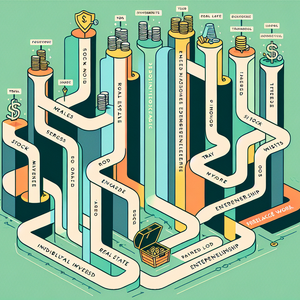Navigating the Gig Economy: Insights from Robert Half

The gig economy has witnessed exponential growth in recent years, propelled by advancements in technology and shifting workforce preferences. A report by McKinsey estimates that approximately 30% of the U.S. workforce is engaged in some form of gig work. This shift can be largely attributed to the desire for greater autonomy, improved work-life balance, and the potential for increased income. Gig work encompasses a diverse array of activities, from ride-sharing and food delivery to freelance writing and consulting, providing individuals with myriad opportunities to monetize their skills.
Supporting Example
Consider the rise of platforms like Uber, Upwork, and Fiverr. These platforms have made it easier for individuals to offer their services and find work, thereby facilitating the entry of more people into the gig economy. For instance, a graphic designer can find clients from various industries across the globe, allowing them to diversify their portfolio and income streams.
Benefits of Gig Work
One of the most attractive aspects of gig work is the flexibility it provides. Freelancers can choose when and where to work, enabling them to create schedules that align with their personal lives. This flexibility can be particularly appealing for parents, students, or anyone seeking to balance multiple commitments.
Broader Range of Experiences
Gig work often allows professionals to gain a wider array of experiences, which can enhance their skill sets and marketability. For example, a digital marketer may work with various brands, learning different marketing strategies and tools along the way. This not only enriches their professional experience but also strengthens their resume.
Increased Income Potential
Another significant advantage of gig work is the potential for increased income. Unlike traditional salaried positions, freelancers can set their rates and take on multiple projects simultaneously. This can be especially lucrative for individuals with in-demand skills such as programming, graphic design, or digital marketing. A successful freelance consultant, for example, may charge premium rates for their expertise, significantly boosting their earnings compared to a fixed salary.
Challenges Faced by Gig Workers
Despite the numerous benefits, gig work also presents unique challenges. One of the most pressing issues is the lack of stability associated with freelancing. Unlike traditional employees, gig workers often do not receive benefits such as health insurance, retirement plans, or paid time off, which can lead to financial uncertainty, especially during lean periods.
Financial Uncertainty
For instance, a freelance writer may find themselves with a full workload one month and little to no work the next. This inconsistency can create stress and make financial planning difficult, necessitating a robust strategy for managing income fluctuations.
Need for Self-Discipline
Furthermore, gig workers must possess strong self-discipline and time management skills. Without a structured environment, freelancers can easily succumb to distractions and procrastination. Additionally, the responsibility of marketing themselves and finding clients can be overwhelming, particularly for those new to the freelance landscape.
How Robert Half Supports Freelancers
Recognizing the evolving nature of the workforce, Robert Half has developed a range of resources and strategies specifically designed to support gig workers. Here are some key insights they offer:
Building a Personal Brand
Robert Half emphasizes the importance of personal branding for freelancers. Creating a strong online presence through a professional website, showcasing a portfolio, and utilizing social media platforms can help attract clients and differentiate oneself in a crowded market.
Networking Strategies
In the gig economy, networking is crucial. Robert Half provides tips on building and maintaining professional relationships, attending industry events, and leveraging online forums and communities. Engaging with other professionals can lead to collaborations, referrals, and new opportunities.
Financial Planning and Management
Understanding how to manage finances as a freelancer is vital. Robert Half offers resources on budgeting, saving for taxes, and planning for retirement. By equipping freelancers with financial literacy, they can navigate the ups and downs of gig work more effectively.
Skill Development
To remain competitive, gig workers must continually update their skills. Robert Half encourages freelancers to invest in professional development through online courses, workshops, and certifications relevant to their field.
Work-Life Balance
Maintaining a healthy work-life balance is essential for long-term success in the gig economy. Robert Half shares strategies for setting boundaries, managing stress, and creating a productive workspace, ensuring that freelancers can sustain their mental and emotional well-being.
The gig economy is here to stay, presenting both opportunities and challenges for professionals seeking flexibility and autonomy in their careers. By leveraging the insights and resources provided by Robert Half, freelancers can navigate this landscape with greater confidence and success. As the workforce continues to evolve, adapting to the gig economy will be essential for those looking to build fulfilling and sustainable careers. Whether you are just starting out or have been freelancing for years, understanding how to strategically manage your career in this dynamic environment will empower you to thrive in the world of gig work.
Freelance Graphic Designer
Marketing agencies, startups, freelance platforms like Upwork and Fiverr
Core Responsibilities
Collaborate with clients to create visual concepts that align with their branding and marketing goals.
Develop a range of design materials including logos, brochures, and social media graphics.
Revise designs based on client feedback and ensure timely delivery of projects.
Required Skills
Proficiency in design software such as Adobe Creative Suite (Photoshop, Illustrator, InDesign).
Strong portfolio showcasing previous work and a diverse range of design styles.
Excellent communication skills for client interactions and project discussions.
SEO Specialist
Digital marketing agencies, e-commerce companies, freelance consulting
Core Responsibilities
Conduct keyword research and implement on-page and off-page optimization strategies.
Analyze website performance using tools like Google Analytics and adjust strategies accordingly.
Stay updated on SEO trends and algorithm changes to enhance site visibility.
Required Skills
In-depth knowledge of SEO best practices and tools (e.g., SEMrush, Moz).
Strong analytical skills to interpret data and generate actionable insights.
Basic understanding of HTML and content management systems (CMS).
Remote Project Manager
Technology firms, consulting agencies, remote work platforms
Core Responsibilities
Oversee the planning, execution, and delivery of projects while ensuring they meet deadlines and budget constraints.
Facilitate communication between stakeholders and team members through virtual platforms.
Utilize project management software to track progress and manage resources effectively.
Required Skills
Proven experience in project management, ideally with certifications such as PMP or Agile.
Strong organizational and multitasking abilities to handle multiple projects simultaneously.
Excellent leadership and motivational skills to guide remote teams.
Content Strategist
Media companies, advertising agencies, corporate marketing departments
Core Responsibilities
Develop and implement comprehensive content strategies that align with business goals and target audience needs.
Conduct audience research to inform content creation and distribution plans.
Collaborate with writers, designers, and marketers to produce high-quality content across various formats.
Required Skills
Strong writing and editing skills with a creative flair for storytelling.
Experience with content management systems and analytics tools to measure performance.
Knowledge of SEO and digital marketing principles to enhance content visibility.
Social Media Manager
Brand management firms, PR agencies, various industries
Core Responsibilities
Develop and execute social media strategies to increase brand awareness and engagement.
Create and curate engaging content tailored to each platform's audience.
Monitor analytics to assess the effectiveness of campaigns and adjust strategies as needed.
Required Skills
Proficiency in social media management tools (e.g., Hootsuite, Buffer) and graphic design software.
Strong understanding of social media trends and best practices.
Excellent communication skills for crafting messages that resonate with the target audience.


